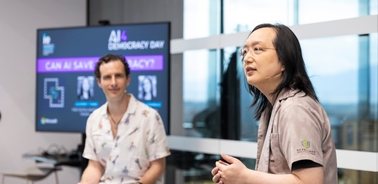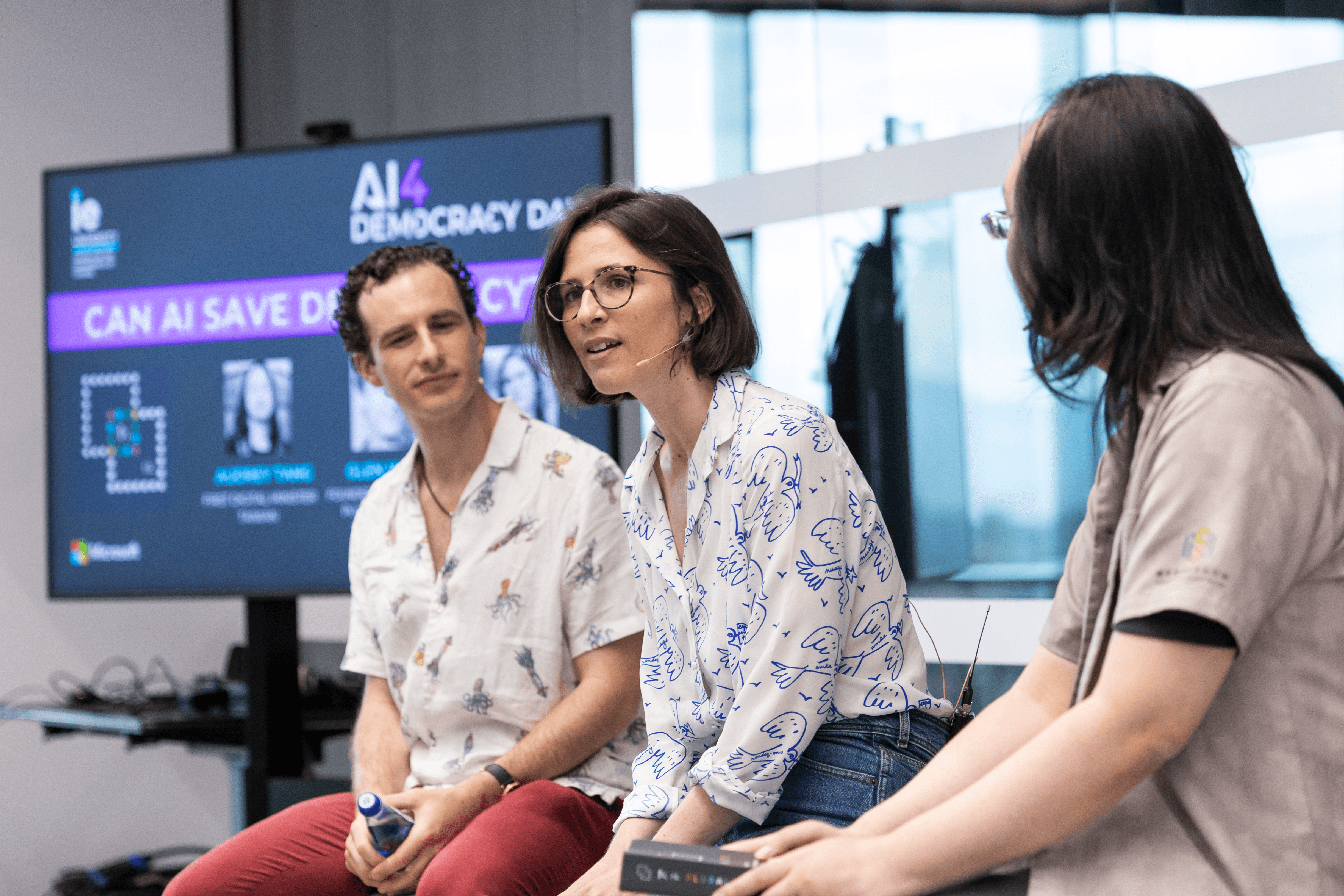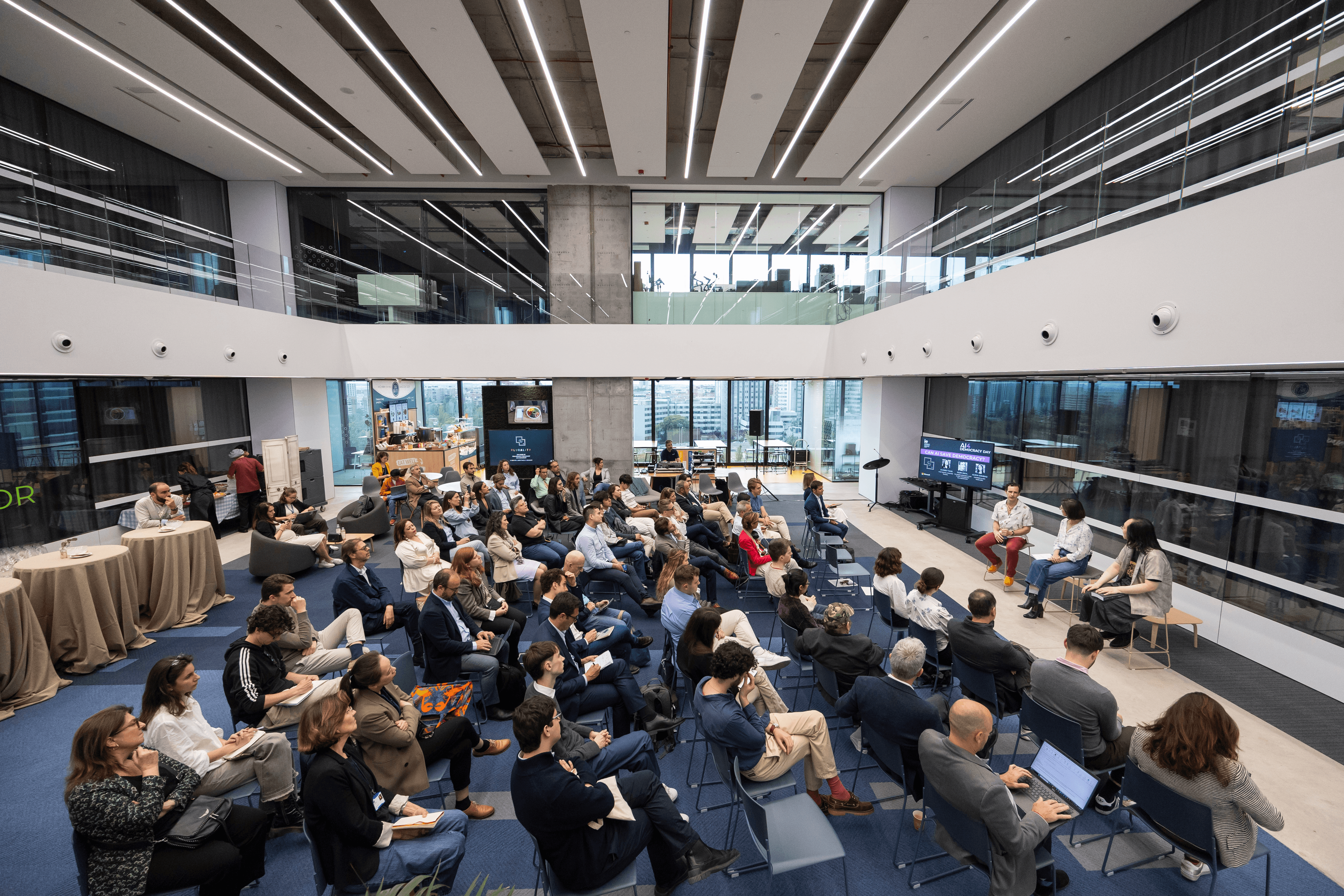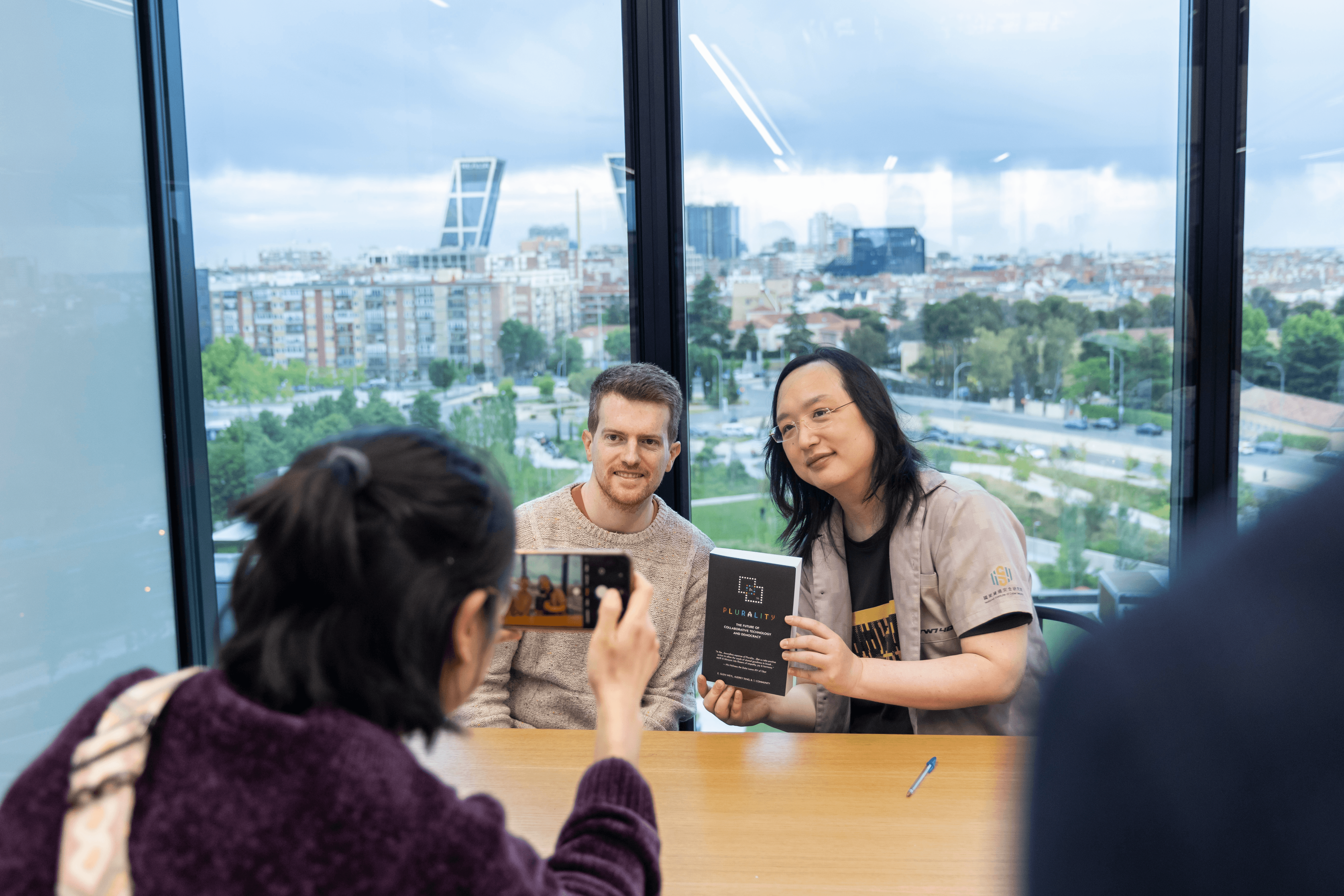- Home
- News And Events
- Audrey Tang And Glen Weyl Discuss Ai And Democracy At Ie University
Audrey Tang and Glen Weyl discuss AI and Democracy at IE University

"When we see "internet of things," let's make it an internet of beings.
When we see "virtual reality," let's make it a shared reality.
When we see "machine learning," let's make it collaborative learning.
When we see "user experience," let's make it about human experience.
When we hear “the singularity is near” — let us remember: The Plurality is here."
Audrey Tang
Madrid, May 22nd, 2024
Yesterday, the Center for the Governance of Change at IE University hosted Audrey Tang, 1st Digital Minister of Taiwan; E. Glen Weyl, founder and Research Lead of the Plural Technology Collaboratory, a Microsoft Research Special Project; and Alicia Combaz, founder and CEO of Make.org, during AI4Democracy Day. During AI4Democracy Day, we hosted around 100 people at IE Tower to to interact with some of the leaders that are advancing democracy-affirming technologies worldwide.
Firstly, Audrey Tang and Glen Weyl presented their latest book, "Plurality." Following this, Alicia Combaz joined the panel to discuss the potential threats and opportunities of integrating AI into democratic processes.

Here are key takeaways from the conversations:
- As Audrey Tang's concept of the "Internet of beings" suggests, AI can be used to create more welcoming online spaces that foster diverse participation. This aligns with the book "Plurality," which emphasizes the potential of technology to promote collaboration in democratic processes, moving beyond the current model of conflict, which tends to lead to restrictive regulation.
- "Plurality" proposes a radical idea: democracy itself can be viewed as a digital technology. The discussion explored Audrey Tang's concept of transforming democratic conflict into co-creation, which is a central theme of the book. This approach contrasts with the current model where conflict leads to restrictive regulation, hindering democratic progress.
- With technology playing an increasing role in our lives, the need for safeguards in a digital democracy becomes crucial. Alicia Combaz presented the "Democratic Shield," a set of recommendations designed to protect elections from AI-driven threats like deepfakes and misinformation. This initiative directly addresses a vulnerability created by the increasing role of technology in our political systems.
- Glen Weyl emphasized the importance of platforms reflecting the diversity of citizen experiences and needs. This aligns with the book's core message: democracies and technology can thrive together when there's a "plural understanding" of the digital world. This means platforms need to be designed to encompass these diverse perspectives.
This project took place within the framework of AI4Democracy. AI4Democracy is a research and outreach project that, with the strategic support of Microsoft, aims to shed light on innovative ways in which AI is being harnessed to protect and defend democracy.
The four papers that will be published in the context of AI4Democracy will delve into the following topics:
1/ How AI can be used to inform policymaking (June 2024) – Deger Turan and Colleen McKenzie (AI Objectives Institute): This paper will analyze different paradigms under which policy development takes place and illustrate with case studies from 2023 and 2024 how AI tools have augmented civic capacity. It will showcase AI’s potential to support collective agency in ways that systematically feed back into AI governance and AI safety institutions, creating a virtuous circle of improving AI’s impact on society.
2/ Depolarizing and moderating social media with AI (July 2024) – Pedro Ramaciotti (Sciences Po and CNRS): This paper will propose AI tools and guidelines for the enhancement of social media ecosystems, outlining concrete actions to improve compliance and moderation of the digital space. It will explore the potential to provide platforms, regulators and researchers with a new framework for AI development that reconciles societal and business objectives.
3/ Enhancing legislative engagement with AI (September 2024) – Bruce Schneier and Nathan Sanders (Harvard University) and Alicia Combaz and David Mas (Make.org): This paper will explore specific ways in which AI can be used to increase engagement in the legislative process, making residents more informed about and active in policymaking while simultaneously making legislators more responsive and connected to their constituents. It will outline what challenges need to be overcome to deploy these tools equitably.
4/ Securing democratic infrastructures (October 2024) – Andrew Dwyer (Royal Holloway, University of London) and Roxana Radu (University of Oxford): This paper will examine how AI can enhance the security of the materials and processes that enable democratic societies to function well. It will focus on two of these: parliamentary and electoral systems. For each, this paper will explore how AI offers distinct advantages to protect our collective democratic infrastructures from adversarial attacks that seek to undermine democratic societies.
More about the panelists:
Audrey Tang is a prolific Taiwanese free software developer who became both the youngest and the first trans and nonbinary member of the Taiwanese government’s cabinet. She has served as the 1st Minister of Digital Affairs of Taiwan from August 2022 to this month. Tang is well known for championing efforts to integrate technology into government functions while promoting governmental transparency.
Glen Wyle is a renowned economist at Microsoft Research leading the Special Projects Division, a group devoted to mission-driven, engineering-supported, scalable collaborative research projects. He is also the founder of initiatives such as RadicalxChange and the Plurality Institute. Overall, his goal is to imagine and design social institutions that enable human plurality to flourish.
Alicia Combaz is the founder and CEO of Make.org, an independent and non-partisan platform whose purpose is to catalyze citizens’ ideas to implement actions that will shape the society of tomorrow. Founded in 2016, Make.org has engaged 8.7 million participants, with over 260 thousand solutions submitted engaging over 900+ associations and partners. She is also one of the researchers of our research project AI4Democracy.

